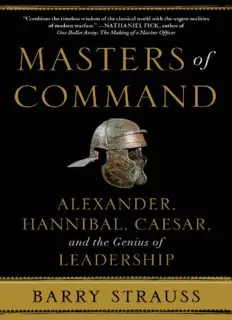
Masters of Command: Alexander, Hannibal, Caesar, and the Genius of Leadership PDF
Preview Masters of Command: Alexander, Hannibal, Caesar, and the Genius of Leadership
PRAISE FOR MASTERS OF COMMAND “Barry Strauss has done it again: Masters of Command combines the timeless wisdom of the classical world with the urgent realities of modern warfare. This is a stunning handbook on leadership—both on and off the battlefield.” —Nathaniel Fick, author of One Bullet Away: The Making of a Marine Officer “Barry Strauss has written a riveting, fast-paced, penetrating volume around three powerful war leaders—Alexander the Great, Hannibal, and Caesar. While other classicists draw on ancient philosophers for lessons on the life well lived, Professor Strauss looks to men of action and determination for lessons on leadership and strategy. It’s a great read, packed with terrific insights.” —Karl Rove “With Masters of Command, Barry Strauss further establishes himself as one of our premier historians of the classical world . . . . There are lessons here not only for budding military strategists but also for ‘great captains’ of the boardroom. And, most important, there is a crackling good read for anyone who delves into this insightful and entertaining new book.” —Max Boot, Jeane J. Kirkpatrick Senior Fellow for National Security Studies, The Council on Foreign Relations, and author of War Made New: Technology, Warfare, and the Course of History: 1500 to Today “Alexander, Hannibal, and Caesar—this is a book on leadership like no other. A rare combination of stirring dialogue, masterful ancient scholarship, and sage advice—both lessons and warnings. Just as Asian corporate planners read Sun Tzu, Western entrepreneurs and strategic thinkers will want to read Masters of Command.” —Robert L. O’Connell, author of The Ghosts of Cannae: Hannibal and the Darkest Hour of the Roman Republic “Barry Strauss has no superior and few counterparts as a scholar of ancient military history and a student of war.” —Dennis Showalter, former president, Society for Military History —Dennis Showalter, former president, Society for Military History Thank you for downloading this Simon & Schuster eBook. Join our mailing list and get updates on new releases, deals, bonus content and other great books from Simon & Schuster. CLICK HERE TO SIGN UP or visit us online to sign up at eBookNews.SimonandSchuster.com CONTENTS Author’s Note Chronology Glossary of Key Names Maps CHAPTER ONE: Ten Qualities of Successful Commanders CHAPTER TWO: Attack CHAPTER THREE: Resistance CHAPTER FOUR: Clash CHAPTER FIVE: Closing the Net CHAPTER SIX: Knowing When to Stop Conclusion Photographs Acknowledgments About Barry Strauss A Note on Sources Notes Index To Donald Kagan, Walter LaFeber, and in memory of Alvin Bernstein AUTHOR’S NOTE Ancient names are spelled following the style of the standard reference work, The Oxford Classical Dictionary, 3rd ed. (Oxford: Oxford University Press, 1999). Translations from the Greek or Latin are my own, unless otherwise noted. CHRONOLOGY (All dates are B.C.) 480–479 The Persian Empire invades Greece, led by King Xerxes, and is defeated. 356 Birth of Alexander 338 Macedon defeats Greeks at Battle of Chaeronea; Alexander commands cavalry 336 Philip of Macedon is assassinated; Alexander becomes king. May–June 334 Alexander invades Persian Empire; Battle of the Granicus River Autumn 334 Siege of Halicarnassus June 333 Death of Memnon of Rhodes November 333 Battle of Issus January–August 332 Siege of Tyre 331 Greek revolt against Macedon October 1, 331 Battle of Gaugamela 330 Alexander burns Persepolis; death of Darius; execution of Parmenio and Philotas 330–327 Campaigns in Bactria and Sogdiana May 326 Battle of the Hydaspes July 326 Mutiny in India 325 Alexander returns to Iran Alexander prepares invasion of Arabia
